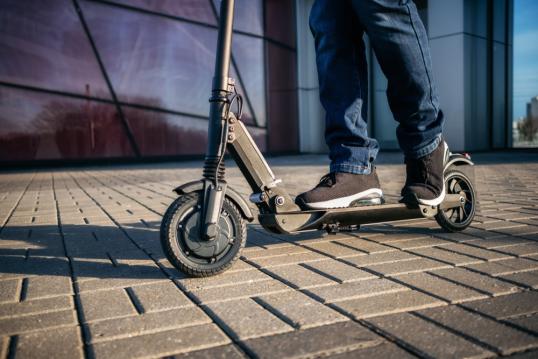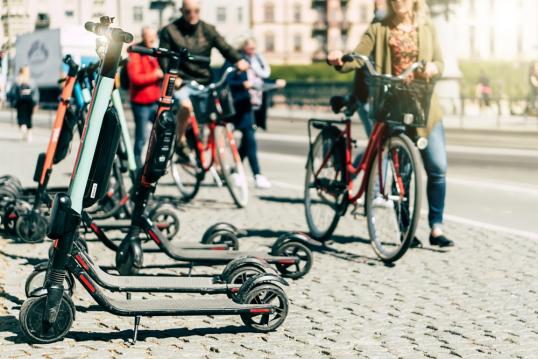- Topic
- Safety and urban mobility
- Shared mobility
- Country
- France
- Resource type
- Case study
First published 23 August 2022
This case study addresses the new role of local authorities in planning and managing new mobility services, while at the same time transforming transport systems. It highlights how the city of Paris took action on free-floating e-scooters by launching a Code of Good Conduct while waiting for the adoption of a new national legal framework.
In 2019, e-scooter trips represented between 0.8% and 1.9% of internal trips in Paris. The city decided to act and put in place specific measures to supervise these new practices – mainly to ease relations between the different micromobility users and to protect the most vulnerable people in the absence of a legal framework.
For almost 18 months there was a major legal vacuum regarding the treatment of e-scooters, since they were not subject to the Highway Code, and the national Law on Mobility (LOM) was waiting for approval by the French government.
Therefore, the city decided to set up a working group for all e-scooter stakeholders, inviting e-scooter operators to sign a Code of Good Conduct by the end of May 2019. Any new e-scooter operator in the city would be integrated into this group and invited to join the Code of Good Conduct, which related to the rental of e-scooters in public spaces, but also to data sharing.
The Code of Good Conduct provided guiding principles and paved the way for good public-private collaboration. Operators are encouraged to work on a deployment strategy that respects other users, with the main aspects of the Code covering:
- Parking and riding rules
- Operators’ commitments regarding safety and security
- Respect for other users, particularly people with disabilities
- Relationship with the city authorities
- Use of e-scooters in line with sustainability priorities of the city.
The city emphasised the need to ensure pedestrian safety and comfort (avoid footpath clutter). In addition, the Code included a data sharing section.
The parking of e-scooters has since been regulated by a municipal law published in July 2019, which prohibits parking on footpaths and in pedestrian areas. This regulation introduced fines for users by municipal police officers and the removal of badly parked scooters. In the summer of 2019, the city started to create a network of 2,500 specific e-scooter parking zones.
Paris is a leading example of local governance and public-private cooperation. Other similar cities are increasingly deciding to be in the driver’s seat when it comes to managing the offer and operations of new mobility services.
If regulated well and integrated into urban mobility policy and goals, new mobility services such as e-scooters can complement the traditional transport offer and provide a first/last-mile solution, with public transport and active travel being the backbone of the transport system.
Context
Cities have experienced a transport transformation over recent years, including the introduction of e-scooters, which have been deployed quickly and on a large scale across many European cities. This has brought with it new and urgent challenges, in particular operational issues that relate to safety, use of public spaces and traffic management for local and regional authorities, urban planners and national decision-makers. As a result, some countries have chosen to adapt their national legislation to take into account safety concerns, infrastructure, street clutter, etc.
The first wave of free-floating e-scooters (scooters that could be rented without a reservation, and picked up and dropped off where you want) surprised European cities and had a disruptive effect due to a lack of dialogue and cooperation between e-scooter operators and the cities. The deployment of e-scooter fleets happened almost overnight and without prior agreement with the local authorities or integration with local-level city strategies. E-scooters were overcrowding the urban space and posed a safety risk to pedestrians.
For some cities, these negative externalities led to the need to regulate. Different regulatory models exist, such as: a hands-off approach; providing regulatory ground-rules; requiring operational permits/licences; contracts for concessions; pilots / demonstrations; banning or not allowing operations, etc.
In 2018, the Parisian context became favourable for free-floating e-scooters, with:
- the presence of a consolidated, reliable and dense public transport offer;
- the increase in cycling infrastructure;
- the absence of a national legal framework until the end of 2019 (due to a delay in the adoption of a new Law on Mobility (LOM);
- the political will to welcome and support new forms of shared soft mobility;
- a population ready to opt for shared modes and able to pay the fare (between EUR 3 and EUR 4).
More than 15,000 e-scooters were introduced across the city in early 2019, which offered a travel alternative for short trips.
The delayed response between the appearance of these new services and the evolution of the regulatory framework led Paris to need to address the issues identified by focusing first on dialogue with the operators.
In action
In 2017, thousands of dockless rental bikes were scattered across the city of Paris, in a move that caught city officials by surprise. Hundreds of bikes were vandalised or stolen, and most of the operators subsequently left the market. The city of Paris responded by drafting a Code of Good Conduct for rental bikes and for mopeds. To prevent history repeating itself, in June 2018 when the first operator of free-floating electric scooters (Lime) arrived in the capital, The city set up a working group with e-scooter operators. Gradually, new e-scooter operators that arrived in the city were integrated into this group to work to develop a Code of Good Conduct for the rental of e-scooters in public spaces and for data sharing (continuing the Code of Good Conduct for rental bikes and mopeds). The Code included precise rules, as intended by the city of Paris authority, and is considered a milestone in the field of e-scooter regulation. All operators deployed in Paris signed the Code in May 2019.
In parallel:
- In April 2019, the Paris Council deliberated on establishing a fee for all free-floating operators, including scooters (from EUR 50 to EUR 65 per scooter depending on the size of the fleet deployed).
- In June 2019, the Mayor of Paris called on operators of e-scooters to take a series of actions, to:
- limit their speed to 20 kph and 8 kph in pedestrian areas and meeting areas;
- freeze the number of e-scooters available in Paris;
- and, if possible, reduce the number until the government clarified the legal framework.
- On 30 July 2019, a municipal law that related to the parking of e-scooters was published to prohibit parking on footpaths and pedestrian areas, with fines for users by municipal police officers. E-scooters were authorised to park in paid parking spaces used by cars and spaces dedicated to motorised two-wheelers on the road.
Results
The success of the Paris Code of Good Conduct was possible thanks to a spirit of cooperation between the public and private sector, but mostly due to strong political leadership in an attractive “Global City”.
Some of the key results are highlighted below:
- The swift introduction of the Code of Good Conduct helped Paris to minimise negative externalities and maximise the potential of e-scooters.
- The Code of Good Conduct represented a step towards building better relationships with operators. It received massive support from the operators, who unanimously subscribed to it.
- A major follow-up was the call for applications from the city of Paris in July 2020 to select three operators for a duration of two years. The three selected operators deployed their fleet in September 2020. A second call for applications followed, and the selection process is currently ongoing (August 2022).
- Last but not least, the Paris experience has demonstrated the power of cities to change certain business practices in mobility. Following the introduction of the new rules, the city noted a change in business models from the e-scooter operators’ side. Operators realised and accepted that their business model was not accepted by cities (e.g. abusive practices), and that cooperation with local authorities was essential for the success of their business.
Challenges, opportunities and transferability
The introduction of the Code of Good Conduct was a new and challenging planning exercise for the city of Paris. The rapid influx of e-scooter operators took the city authorities by surprise, with operators arriving from all over the world.
At the same time, Paris is a unique city with a high population density (more than 22,000 inhabitants per km2), more than 12 million inhabitants in the Ile de France region, and many tourists. Making e-scooters work for the city quickly became a priority, hence the city authorities worked to prevent the unmanaged spread of e-scooters.
The city developed a set of rules for operators. A strong political leadership also helped, with public announcements of the temporary prohibition of e-scooters in cases of non-compliance with the Code of Good Conduct. In parallel, in 2019 The city also provided 2,500 obligatory parking spaces for 15,000 e-scooters. E-scooter operators have to supply the devices with green energy and recycle old vehicles to improve their full life cycle potential to support a circular economy.
While the Code of Good Conduct has always been a voluntary commitment (non-binding), e-scooter operators have understood that subscribing to it was in their best interest. They have complied with the rules established by the city, and shared data freely. This has led to a professionalisation of micromobility operations across the whole sector (which were better organised and less chaotic), including an improved offer from new operators, in a spirit of collaboration.
This successful cooperation required two key challenges to be overcome:
- the legal vacuum regarding the parking of e-scooters, i.e. the removal of e-scooters from public spaces in the absence of a national law;
- the balancing of private business interests with public ones, for instance when ensuring road safety.
As illustrated by the city of Paris, such public policies should be addressed locally, on a case-by-case basis. They should take into account the local context, but also the peri-urban context. Today, in 2022, there is generally a more widespread expertise of shared micromobility management, which could help to improve connections with peri-urban areas. This is something to be further explored, while building on local best practice.
In Depth
https://www.eltis.org/sites/default/files/sump_topic_guide_micromobility_devices.pdf
https://www.euractiv.com/section/transport/news/paris-takes-pesky-e-scooter-fleets-to-task/
https://www.themayor.eu/en/a/view/paris-introduces-new-e-scooter-rules-3631
Other related items on Eltis:
https://www.eltis.org/resources/videos/paris-micromobility-revolution
https://www.eltis.org/in-brief/news/benefits-micro-mobility-cities
https://www.eltis.org/in-brief/news/new-european-coalition-promote-micromobility
Photo Credits: Markus, Mainka, Pigprox, Andrei Bortnikaiu, Chan2545 © / Shutterstock.com - no permission to re-use image(s) without separate licence from Shutterstock.




